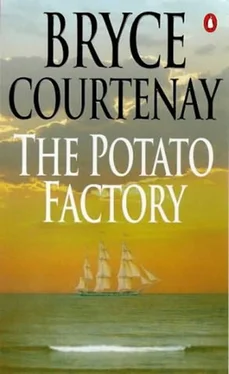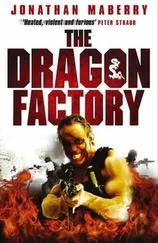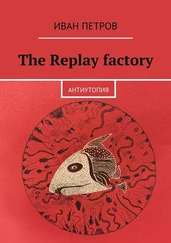Bryce Courtenay - The Potato Factory
Здесь есть возможность читать онлайн «Bryce Courtenay - The Potato Factory» весь текст электронной книги совершенно бесплатно (целиком полную версию без сокращений). В некоторых случаях можно слушать аудио, скачать через торрент в формате fb2 и присутствует краткое содержание. Жанр: Современная проза, на английском языке. Описание произведения, (предисловие) а так же отзывы посетителей доступны на портале библиотеки ЛибКат.
- Название:The Potato Factory
- Автор:
- Жанр:
- Год:неизвестен
- ISBN:нет данных
- Рейтинг книги:3 / 5. Голосов: 1
-
Избранное:Добавить в избранное
- Отзывы:
-
Ваша оценка:
- 60
- 1
- 2
- 3
- 4
- 5
The Potato Factory: краткое содержание, описание и аннотация
Предлагаем к чтению аннотацию, описание, краткое содержание или предисловие (зависит от того, что написал сам автор книги «The Potato Factory»). Если вы не нашли необходимую информацию о книге — напишите в комментариях, мы постараемся отыскать её.
The Potato Factory — читать онлайн бесплатно полную книгу (весь текст) целиком
Ниже представлен текст книги, разбитый по страницам. Система сохранения места последней прочитанной страницы, позволяет с удобством читать онлайн бесплатно книгу «The Potato Factory», без необходимости каждый раз заново искать на чём Вы остановились. Поставьте закладку, и сможете в любой момент перейти на страницу, на которой закончили чтение.
Интервал:
Закладка:
In the matter of books for her pupils Mary enlisted the help of Elspeth Smedley, who rented books in large numbers from the Hobart Town Circulating Library. This institution was presided over by the stern-faced Mrs Deane who, had she known their destination, would not have permitted the books to be released from her possession. Convicts were not allowed to rent books and the thought of orphans reading them, with their dirty little hands, would have caused a great fuss in the small community. As it was, Mrs Deane marvelled at Elspeth Smedley's ability to read so many volumes on every subject, and judged her quite the best-informed woman on the island. Privately she thought the parson's sister's reading was most eclectic, in some things juvenile to the greatest degree while her other tastes were distinctly scholarly. But she did not make the obvious connection that the books were being used in the orphanage. The very idea that the illegitimate brats of convicts and whores might be brought to learning was less believable than the notion that the moon was composed of green cheese.
The money for the books came, of course, from Mary's Potato Factory, and while Elspeth Smedley may herself have pondered the source of Mary's seemingly unlimited resources, she would not have dreamed of asking her for an explanation. Mary had encouraged Elspeth to become a teacher herself, and in this matter the gentle and retiring spinster sought to stand up to her bucolic older brother.
When confronted with Elspeth's request, Thomas Smedley ordered that she withdraw from the wicked influence of 'the Factory whore', as he had come to call Mary in private. He had long since cancelled Mary's salvation. She had clearly shown by her lack of humility and contrition, and by her willingness to argue with him on every conceivable subject, that her redemption had been nothing but a ruse to win his approval for her orphan school. He forbade Elspeth to enter Mary's class, or even to converse with her at the midday meal.
Elspeth had not disobeyed her brother's instructions. She found, however, that her extreme disappointment at his decision had entirely erased the numerous recipes she carried in her mind, save only for a recollection of how to boil potatoes.
For two weeks, morning, lunch and tea she served boiled potatoes and small beer until Thomas Smedley could stand it no longer, the demands of his stomach finally overcoming his principles. He had become quite pale and listless, and when the pangs of hunger and the desire for red meat could no longer be contained he had taken to walking down into Liverpool Street to take a meal at a chop house. He was a man who loved his food, and the boiled and fried mutton and badly prepared kangaroo flesh available as cheap fare in an eating house, though preferable to boiled potatoes, was not in the least to his liking. Elspeth was most grudgingly allowed to teach with Mary in the orphan school.
It was a decision which possessed the divine power to recall Elspeth's memory. That very night a splendid pot roast, garnished with tiny spring onions and a boat of rich gravy at its side, with a dish of rice and another of vegetables, was placed steaming upon the table, proving once again that principle is soon swamped by the gravy of greed.
David and Ann Solomon had not been to school since leaving England. An attempt had been made to enrol Ann in Mrs Bamber's boarding school for young ladies when Hannah had been assigned to the Newman family, but her application had been refused on the basis of breeding. The learning levels of both children were three years behind what might have been expected had they remained in England but the general intellectual fare served up at the orphanage was still not sufficient to occupy their minds. Mary had eventually allowed David to learn to work her abacus. Ann, too, had begged to be allowed to play with Mary's beads, insisting she also could make the numbers work. But Mary, sensing David's pride that he alone had been permitted to use her precious abacus, would not allow his sister the same privilege.
'Ann, you are our best reader and it be with books that you excel. David already knows the big numbers and can divide and multiply and add and subtract to make our very 'eads spin. Your turn will come when you be a little older and learn the bigger numbers.'
'It's not fair!' Ann protested, stamping her foot. 'I know a big number and I can write it too!' Whereupon she took up her slate and wrote the number 816.
'What number does that say, Ann?' Mary asked.
'Eight 'undred and sixteen, miss,' she exclaimed, then added triumphantly, 'See! I told you I can do big numbers!'
Mary took up the child's slate and, transposing the numbers, wrote 618 upon it. 'What is this number then?' she asked Ann. 'Say it in 'undreds again, like the last.'
The child stared without comprehension at the new number on her slate. 'It's not fair, I could learn it, I could so!' Ann began to sob, though more in anger at not getting her way, than in distress.
Mary, laughing, took Ann into her arms. 'Eight 'undred and sixteen be a lovely number, Ann. We will soon enough teach you others just as grand.'
Ann pulled away from Mary's embrace, her blue eyes large in her pinched little face as she pronounced, 'Anyway, our mum says it's the only big number we needs to know, and whatever should 'appen to 'er, we must never, never forget it!'
At this sudden recollection of her mother, Ann began to sniff and then to cry softly and although she was eight years old she was no bigger than a child of five or six and Mary took her once again onto her lap and this time she rocked her and kissed the centre parting of her lovely auburn hair and held her tight until she became calm.
Mary thought little more of the incident until the number 816 began to occur regularly in David's work on the abacus. He would often divide into it, subtract from it or find the various multiples of it.
'What be it with the number eight 'undred and sixteen, David?' Mary had finally asked. 'Were it perchance the number of your 'ouse in London?'
David flushed deeply and with a vigorous, though unconvincing, shake of his head replied, 'No, Miss, it be just a number. I didn't know as I were usin' it particular.'
But Mary noted that David Solomon never used the number again, while Ann continued to write it upon her slate when she appeared distracted. Later, when Ann had progressed and learned her multiples of ten and then of a hundred, the number 816 would still occur frequently in her arithmetic.
Though Mary had no time to ponder this childish conundrum she nonetheless tucked the number 816 away. She would not forget it, if only because her mind was so trained to numbers that no digit brought to her attention, for whatever purpose, was ever again forgotten.
Chapter Twenty-six
Ikey saw very little of Hobart Town upon his arrival back in Van Diemen's Land. He was taken directly to Richmond Gaol, some twenty miles out of town, where convicts were put to work upgrading the road to Cole-brook. A huge penal settlement was being built to house the influx of convicts now that New South Wales was becoming a popular destination for free settlers from England.
'G'warn, get yer backs into it, yer miserable bastards!' Harris, the overseer of the road gang, liked to shout. 'Governor Arthur 'imself told me 'e needs a new place o' misery to 'ang ya and flog yer useless 'ides!'
In fact, Richmond Gaol served as much to hold the convicts building a road to Arthur's private property, Carrington, as for any other purpose. Governor Arthur abolished land grants to emancipists first, and then altogether, but had nonetheless awarded himself a great acreage, without the payment he demanded from everyone else. He then directed the ceaseless labour of convicts to be lavished upon it, equipping Carrington with a fine stone residence and outer building, fences and roads, all of which were the envy of the wealthiest free settler and worthy of any country estate in England. It was upon Arthur's own road near Richmond that Ikey found himself harnessed to a cart.
Читать дальшеИнтервал:
Закладка:
Похожие книги на «The Potato Factory»
Представляем Вашему вниманию похожие книги на «The Potato Factory» списком для выбора. Мы отобрали схожую по названию и смыслу литературу в надежде предоставить читателям больше вариантов отыскать новые, интересные, ещё непрочитанные произведения.
Обсуждение, отзывы о книге «The Potato Factory» и просто собственные мнения читателей. Оставьте ваши комментарии, напишите, что Вы думаете о произведении, его смысле или главных героях. Укажите что конкретно понравилось, а что нет, и почему Вы так считаете.












